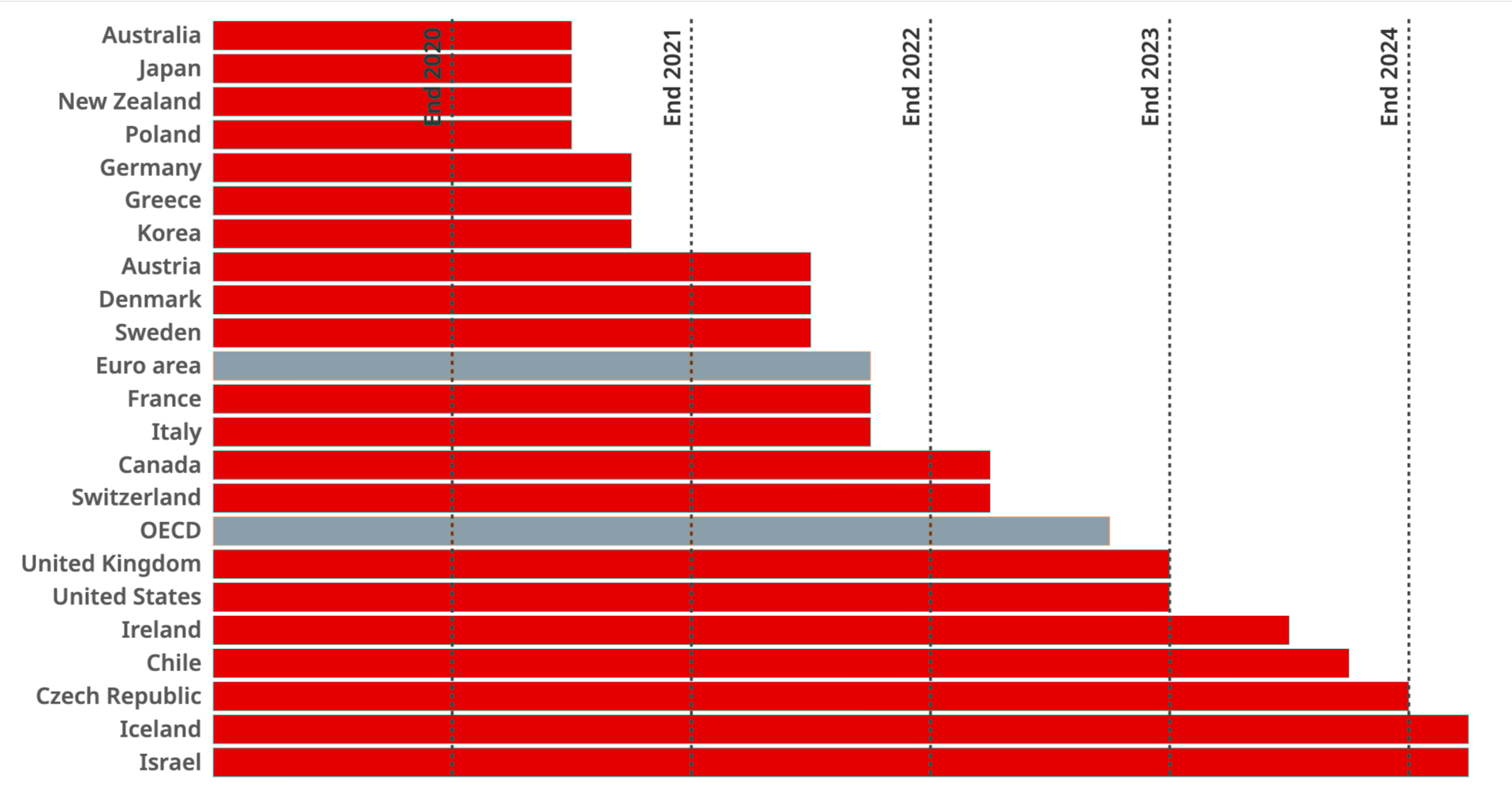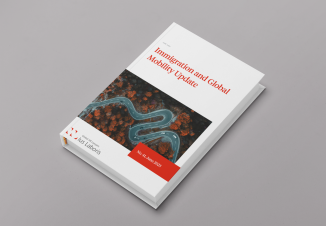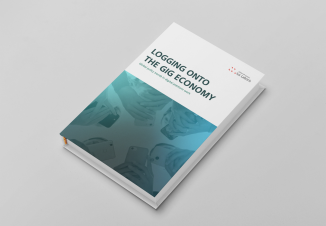
Research on the impact of Covid-19 shows severe economic damage. The OECD reported in May 2021 that there were 20 million fewer jobs in OECD countries and over 110 million fewer jobs worldwide.[1] The World Bank announced that between October 2020 and January 2021, sales of one in four companies had decreased by 50%, and on average, sales dropped by 27%.[2]
Companies that reacted and adjusted fastest during the initial waves had a better chance of survival. Now the challenge is for businesses to build back stronger to survive and thrive over the long haul.
Impact on business varied
Not every business was affected to the same extent. Although on average, sales dropped by 27%, some businesses’ sales stayed the same and even increased by up to 34%. On the less fortunate end of the spectrum, some businesses saw their sales drop by up to 72%.
This difference could be largely explained by several factors: how much each country was affected by Covid-19; the impact on the sector affected; and the size of the business (not surprisingly, smaller firms were more badly affected), although these factors alone did not guarantee a similar impact.[3]
Businesses fought back
Businesses reacted to Covid-19 by adjusting their payrolls and using technology to greater effect. 65% of businesses reduced working hours and granted leave. This worked to some extent and meant that only 11% of companies laid workers off.[4] Businesses increased their use of digital platforms, social media, and the internet. They invested in new equipment and software. But not everyone had the same resources. The World Bank reports that poorer countries and smaller firms were left behind in adopting digital solutions.
Governments lent a hand
Governments adopted policies to help businesses and prevent insolvencies, but unsurprisingly, it was the high-income countries that had the most resources to put to this. Only 1 in 10 companies in low-income countries received public support,[5] while this rate was 50% in high-income countries. Yet, it seems that the resources could have been distributed more efficiently even in the high-income countries. Studies note a failure to communicate about support programmes. The World Bank reports that 40% of firms described a lack of awareness and “one-fifth of firms that did not experience any shock or sales drop due to COVID-19 report having received public support” Which means that smaller firms were worse affected by Covid, as it was larger firms that received the bulk of support.[6]
Some employees were worse affected than others [7]
Although almost everyone’s job and life has been affected in some way by the pandemic (and continues to be), the more vulnerable members of society tended to be the worst hit. According to the OECD, there was a fall in the number of hours in low-paying jobs that peaked in the second quarter of 2020 at 28%, whilst the same metric was 10% for high-paying jobs.
Young people were worse affected than older employees. People at the beginning of their careers had a harder time finding jobs, as there were fewer opportunities, and many young people working in hard-hit sectors on insecure contracts simply lost their jobs. Across the OECD countries, nearly 3 million more young people are not employed, in school or in training than before the pandemic.
Those with a low level of education were more likely to lose their jobs than highly-educated workers and less likely to work from home. In fact, studies show that highly educated employees were more likely to be able to work from home – which protected their jobs. The lower the level of education, the less likelihood of working from home, which contributed to a decrease in working time and increased job losses.
Similarly, those who worked on temporary contracts were hit hard by the first wave – and this effect was compounded if their level of education was low. The hours worked by temporary workers fell by an average of 28% year on year – which is more than double the figure for permanent workers.
Some of us became more anxious and depressed
The toll of Covid was not purely economic. Research is now showing the damage to many people’s mental health. Depression and anxiety sharply increased and even doubled in some countries. And although everyone had their share of stress and anxiety, some people were more seriously affected. Studies indicate that the unemployed and financial insecure were worse affected than the general population.[8] For those in work, healthcare workers, migrant workers, and workers in direct contact with the public were the ones most likely to be affected by mental health problems such as anxiety, depression, sleep disorders, and even post-traumatic stress disorder. Again, younger and more highly educated people were more prone to the adverse psychological effects of job insecurity, isolation, and uncertainty about the future.[9]
Despite the latest new variant, Omicron, governments are so far avoiding a return to full-blown lockdowns and the world appears to be slowly recovering economically – if not yet health-wise. The unemployment rate, which skyrocketed in the second quarter of 2020, has started to subside though it is still higher than pre-pandemic levels.[10] But not everyone is recovering at the same rate, and the average employment rate within OECD countries is predicted to return to its pre-pandemic rates only towards the end of 2023 – and that depends on unknowns, such as the impact of new variants, including the one that is currently sweeping the world, Omicron.
Just as some countries recover more slowly than others, so do some groups within society. Those who lost their jobs altogether have a harder time recovering than those on reduced working time, as reduced or furloughed workers could more easily return full-time work afterwards.

Some studies conducted at the beginning of 2021 warned that although measures adopted by governments helped prevent a wave of insolvencies at the time, this should not be assumed to have shored up the economy permanently. Most likely, it has merely been postponed the danger. According to the World Bank: “lower sales, higher unemployment, firm liquidity challenges, heightened corporate vulnerabilities, and the expected rise in non-performing loan levels suggest that the risk of a wave of insolvencies has not disappeared.”[11]
Covid isn’t the only challenge
Alarm bells are ringing for our blue planet. In August, the Intergovernmental Panel on Climate Change (IPCC) published a report which is, according to UN Secretary-General António Guterres, a “Code Red for humanity.” The increase in environmental disasters in the last few years backs up this analysis. Our economic lives will surely be severely affected by the distress our home planet is facing unless we act very rapidly and decisively.
Both governments and businesses around the world must work to mitigate these predictions. Although governments shoulder the biggest responsibility, businesses need to do their bit in the interests of their own futures. As they form part of the economic eco-system, the decisions they make about how to build back for the future will have an impact on the economy as a whole and the societies in which they operate – not to mention their workforces.
However positively we think about the future, it would not be realistic to expect Covid-19 will be the last crisis we face. So just returning to the old ways is not a feasible plan. Businesses need to find ways to build a ‘new normal’ – even though this will inevitably involve some permanent and potentially radical changes to professional life. Many employers are in the throes of adopting permanent hybrid-work models, for example, using digital tools to support them. But this means they also need to become savvy about the increased chance of security breaches that digitalisation inevitably entails and, in doing so, remembering to be mindful of the ‘people’ aspects of working remotely, such as dealing with isolation. So building a resilent HR practice means accepting change, planning the best model for that change within your business and being prepared to face down any obstacles that appear in the way. The holy grail then, is a resilient business model, with a well-supported and resilient workforce. Or, in a word: resilience.
[1] OECD, Employment outlook 2021 – A once-in-a-lifetime Opportunity to Build a Better World of Work, https://oecd.org/employment-outlook
[2] The World Bank, Tracking an Unprecedented Year for Businesses, Everywhere, 17.02.2021, https://www.worldbank.org/en/news/feature/2021/02/17/tracking-an-unprecedented-year-for-businesses-everywhere
[3] The World Bank, Tracking an Unprecedented Year for Businesses, Everywhere, 17.02.2021, https://www.worldbank.org/en/news/feature/2021/02/17/tracking-an-unprecedented-year-for-businesses-everywhere
[4] The World Bank, How COVID-19 is Affecting Companies Around the World, 17.02.21, https://www.worldbank.org/en/news/infographic/2021/02/17/how-covid-19is-affecting-companies-around-the-world
[5] The World bank, How COVID-19 is Affecting Companies Around the World, 17.02.2021, https://www.worldbank.org/en/news/infographic/2021/02/17/how-covid-19is-affecting-companies-around-the-world
[6] The World Bank, Tracking an Unprecedented Year for Businesses, Everywhere, 17.02.2021, https://www.worldbank.org/en/news/feature/2021/02/17/tracking-an-unprecedented-year-for-businesses-everywhere
[7] OECD, OECD Employment Outlook 2021 : Navigating the COVID-19 Crisis and Recovery, 2021, https://www.oecd-ilibrary.org/sites/5a700c4b-en/1/3/1/index.html?itemId=/content/publication/5a700c4b-en&_csp_=d31326a7706c58707d6aad05ad9dc5ab&itemIGO=oecd&itemContentType=book
[8] OECD, Tackling the mental health impact of the COVID-19 crisis: An integrated, whole-of-society response, 12.05.2021, https://www.oecd.org/coronavirus/policy-responses/tackling-the-mental-health-impact-of-the-covid-19-crisis-an-integrated-whole-of-society-response-0ccafa0b/
[9] Giorgi, Gabriele et al. “COVID-19-Related Mental Health Effects in the Workplace: A Narrative Review.” International journal of environmental research and public health vol. 17,21 7857. 27.10.2020, https://www.ncbi.nlm.nih.gov/pmc/articles/PMC7663773/
[10] OECD, Unemployment rate, https://data.oecd.org/unemp/unemployment-rate.htm
[11] The World Bank, Muro under the supervision of Uttamchandani, The Calm Before the Storm: Early Evidence on Business Insolvency Filings After the Onset of COVID-19, 25.02.2021, https://documents1.worldbank.org/curated/en/962221615273849133/pdf/The-Calm-Before-the-Storm-Early-Evidence-on-Business-Insolvency-Filings-After-the-Onset-of-COVID-19.pdf


